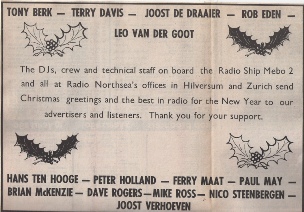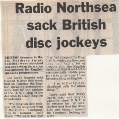© 2014-


RNI - History (6)
Now that information about the unsavoury pirate war being fought off the coast of Holland had become public knowledge the Dutch Prime Minister announced on 27th May 1971 that legislation to ratify the Strasbourg Convention of 1965 and to outlaw offshore broadcasting stations would be brought before Parliament by the end of the year.
On RNI programming continued as normal while repairs to the Mebo II were carried out at sea. Throughout the spring and summer of 1971 the newly confident RNI consolidated and expanded its services on all fronts. A news service had been introduced on 10th April 1971 and, just before the bombing, the station had extended its Dutch and English language programmes by two hours each day. At the end of June 1971 a separate 'World Service' programme was launched on the shortwave transmitters between 7.00am and 3.00pm each Sunday. The financially lucrative Dutch service was again extended to 12 hours a day (6.00am-
The hearing against Bull Verweij, Norbert Jurgens and the three divers who had bombed the Mebo II was concluded on 21st September 1971 when all five men were found guilty and sentenced to one year in prison.
Drama of another kind affected RNI in November 1971. At 8.10am on 22nd November the Mebo II radioed that she was adrift after losing her anchor and all programmes from RNI stopped shortly afterwards as the vessel had entered Dutch territorial waters. Rescue services raced to the stricken ship and the salvage tug Smitbank put a line aboard the Mebo II and towed her back to an anchorage position in international waters. Broadcasts of RNI's programmes were able to resume at 4.30pm.
Towards the end of December 1971 RNI's Sunday World Service was abruptly discontinued, although ‘ Northsea Goes DX’ -
1972
In February 1972 'Northsea Goes DX' returned on medium wave (AM) on 269 m (1115 kHz) as well as on shortwave.
In June 1972 the Dutch Service of RNI moved into new studios near Bussum in Holland. The new studio, which was the result of the commercial success of the Dutch language broadcasts contained extensive facilities for programme recording as well as commercial and jingle production.
On 30th September Radio Veronica implemented a change its frequency from 192m to 538m. A few seconds after 12.30pm when Radio Veronica vacated their old wavelength RNI opened a second service -
The RNI English Service did not come on the air as usual on 24th October 1972, being replaced with non-
1973
On 23rd February 1973 the Mebo II's anchor chain broke during a storm and transmissions on all frequencies were stopped as the radio ship had drifted inside Dutch territorial waters. Broadcasts recommenced the following day after the Mebo II had been towed back to her position and a new anchor chain fitted.
Adverse weather conditions caused much worse problems for all three radio ships off the coast of Holland on 2nd April 1973. A gale had been blowing all day which steadily increased in intensity until it reached hurricane force. The storm damaged RNI's transmitter masts and the station's signal deteriorated so severely that by 5.00pm it had to leave the air. It was not until the following afternoon that low power transmissions were able to start once again, but on medium wave and shortwave only. The FM aerial had been so severely damaged that transmissions in that waveband did not resume for over three weeks.

Mebo II adrift, November 1971

Click on picture to enlarge

The Sun, 17th May 1971

Disc, 29th May 1971

Record Mirror, 4th November 1972
Christmas greetings from RNI, Record Mirror, 18th December 1971
Click to enlarge
World Service ID

Dutch language announcement about drifting of Mebo II

End of Radio Veronica on 192m and tests for RNI2 on 192m

Return of English language service, 3rd November 1972

Anchor chain broken announcement by Don Allen


History
Key Dates
Ship and Location
Technical
Staff
Programmes





Treasure Chest


Back to Netherlands/Belgium Gallery





Back to Britain Gallery


Back to RNI
